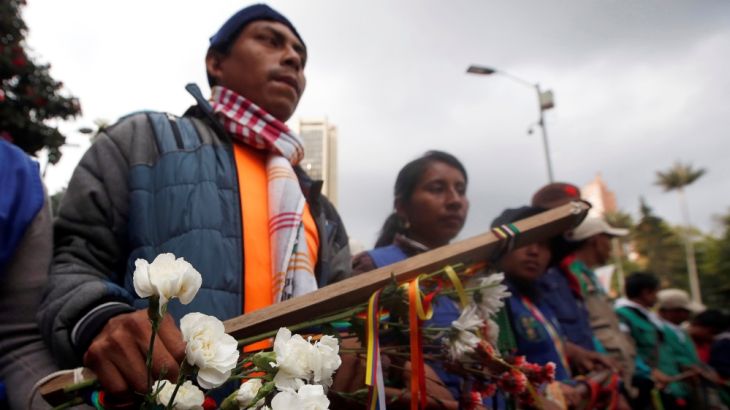Colombians take to streets to support FARC peace deal
Thousands of people march in Bogota and elsewhere calling on the government and FARC rebels to save a peace deal.

Thousands of people have marched in cities across Colombia to demand a peace deal between the government and leftist rebels not be scuttled.
Wednesday’s demonstrations marked the second time in a week that Colombians took to the streets to support the accord signed last month with the Revolutionary Armed Forces of Colombia (FARC) and now hanging by a thread after a shock referendum defeat for the deal.
Keep reading
list of 4 itemsColombia agrees with ELN rebel group to extend truce
Amid uptick in kidnappings, Colombian family receives ‘biggest gift of all’
Her son was killed by the Colombian military. Now, she’s getting an apology
OPINION: Colombia – A Nobel Prize to save peace
“We have seen hundreds of representatives of indigenous groups, Afro-Colombians and other groups of minorities who walked through Bogota demanding peace,” Al Jazeera’s Alessandro Rampietti, reporting from the capital Bogota, said.
|
|
“They were marching together with students, victims of the conflict and just regular families.”
In Bogota, victims of the decades-long conflict carrying photos of dead loved ones were greeted by well-wishers handing white flowers symbolising peace.
“We victims are in a state of limbo, we need the accord now,” Diana Gomez, a 38-year-old activist whose father was killed a decade ago, told The Associated Press news agency.
She said her father’s murder remains unsolved – one of many unresolved cases during a 52-year-old conflict that claimed the lives of 220,000 people and left almost eight million displaced.
Deal adjustments
President Juan Manuel Santos, winner of this year’s Nobel Peace Prize, is in talks with the opposition and FARC to make adjustments to the accord following its narrow rejection in a referendum six days after it was signed in front of world leaders.
READ MORE: Colombians divided after voters reject FARC peace deal
But it is not clear he can save the deal as opponents push for stiffer penalties for rebel leaders and fighters.
Under the terms of the accord signed on September 26, FARC leaders would be able to serve in Congress, with a guarantee of 10 seats, while fighters who confessed their crimes would be spared time in jail and instead ordered to carry out community development work in areas hard hit by the conflict.
|
|
“This isn’t a question of cosmetic changes,” former President Alvaro Uribe, who led the campaign against the peace deal, said on Wednesday after delivering to government officials a list of proposals that he said would strengthen and provide broader support for the accord.
“In a country of institutions like Colombia, transitional justice can’t consist of failing to punish those responsible for atrocious crimes.”
The FARC leader Timoleon Jimenez, known by his nom de guerre Timochenko, tried to put on a brave face on Wednesday, saying that the group is open to making adjustments even if it is not willing to start negotiations again from scratch.
IN PICTURES: The last days of the FARC
“Personally I think it may have been good that this happened,” said Timochenko, referring to the referendum loss, in a rare, hour-long interview with Caracol Radio.
“It allows us to clear up many doubts and especially commit the important segment of the Colombian society that didn’t vote, more than 63 percent, to take an interest in this history-making event.”
|
|
Wednesday’s march on the Plaza Bolivar, adjacent to the congress and presidential palace, appeared to be larger than last week’s rally, a potential sign of how politically apathetic Colombians have been jolted into action by the fading prospects for peace.
In recent days, the Plaza has been overtaken by dozens of tents set up by peace activists and on Tuesday was blanketed with a giant, white shroud containing the names of almost 2,000 victims of the conflict stenciled in ash.
Santos has applauded the outburst of activism, and on Wednesday reiterated the need to seek a quick solution to the impasse so that a ceasefire in place does not unravel.
“The great majority of people have asked me to find a solution soon because uncertainty is the enemy,” he said in televised address.